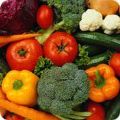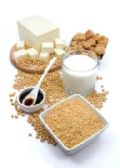|
The humble soybean has come a long way. Today, soy is everywhere and in every possible form—beans, nuts, milk, yogurt, cheese, flour, tofu, tempeh, and “meat” analogs, to name a few. You can eat soy alone, cooked, or combined with other ingredients for a fantastic high-protein, low-fat snack or meal. In fact, one in four Americans eats a soy-containing food at least once a week. Soy is a powerful plant food, packed with valuable protein, essential fatty acids, numerous vitamins and minerals, and fiber. It also contains phytochemicals such as isoflavones, phytate, saponins, and phytosterols. As one of the most widely researched foods for potential health benefits, soy has been touted as a miracle food that may fight cancer, heart disease, osteoporosis and more. But lately, this innocent bean has become the center of confusion and controversy. Several soy studies have yielded inconsistent results and consumers have been bombarded by mixed messages from the media. So here is the rundown on the science behind soy. Heart Health In 1999, the Food and Drug Administration (FDA) concluded that adding soy protein to a diet low in saturated fat and cholesterol could decrease the risk of coronary heart disease (by lowering blood cholesterol levels). The Academy of Nutrition and Dietetics (formerly the American Dietetic Association) also released a statement recommending 25 grams of soy protein daily to help reduce the risk of heart disease. But current research has been unimpressive, finding that soy protein only decreases LDL (bad) cholesterol by three percent and does not increase the HDL (good) cholesterol. The bottom line: Soy’s role in improving cholesterol is small. Even though soy has a relatively modest effect on cholesterol levels, it still can be included as part of a heart-healthy diet. Breast Cancer For consumers, the connection between soy and breast cancer may be the most confusing. After over 15 years of research on this topic, we don’t have any clear-cut answers. In theory, the plant estrogens in soy foods act as anti-estrogens. This means they may block natural estrogen from reaching the cells’ estrogen receptors. Therefore, soy is probably beneficial when the breasts are developing during childhood, making them less vulnerable to cancer. Later in life, when pre-menopausal women experience high levels of natural estrogen, the estrogens in soy may compete with natural estrogen resulting in positive benefits. Post-menopause women, however, have low levels of natural estrogen. Adding plant estrogens at this time may increase the risk of breast cancer. Soy isoflavones may enhance tumor growth in women who have (or have had) estrogen-dependent cancers (like some breast cancers). The bottom line: Studies have not reliably demonstrated an increased or decreased risk of breast cancer among women eating soy. The American Institute for Cancer Research (AICR) states that soy consumption early in life may help protect against breast cancer later in life. The American Cancer Society suggests that those at risk for breast cancer should not consume soy isoflavones. Prostate Cancer Japanese men have lower rates of prostate cancer than men in the United States, and some experts contribute that to the Japanese diet, which is high in soy foods. The results of a few animal studies showed promise in this area. However, two small studies on humans (men) yielded controversial results. Soy isoflavones appeared to lower and improve the PSA (prostate-specific antigen) score for some men. For others, PSA level increased, but at a slower rate. And for certain men, the isoflavones worsened the prostate cancer condition. The bottom line: There are not enough human studies to say whether the isoflavones in soy affect prostate cancer for better or for worse. Menopausal Symptoms Does soy relieve hot flashes, night sweats and other menopausal symptoms? Could soy isoflavones be the reason that Japanese women have a lower rate of hot flashes? Current research does not indicate this and study results have been very inconsistent. Roughly 60 percent of trials showed only modest reductions in hot flashes, while the other 40 percent showed no improvements. The bottom line: The claims that soy helps with menopausal symptoms have been blown way out of proportion. The evidence just does not show much benefit. Bone Health It is still too early to conclude whether or not soy helps to build bones. There are currently a few long-term studies investigating the area of soy and bone health. Contrary to popular belief, Japanese women experience as much (if not more) osteoporosis as Caucasian women in the United States. They do suffer fewer bone fractures, but this may be due to genetics or the shape of their bones. The bottom line: Although it will be a few years before the long-term studies conclude, it does look like soy may benefit the bones. Although soy probably does NOT reverse bone loss, it may help prevent bone loss and increase bone density. Brain Power Does soy improve ones cognitive functioning? Very little research has been conducted in this area. But one small, preliminary study on older adults showed that soy isoflavones did improve cognitive functioning. The bottom line: More investigation is needed in this area. Weight Control Although weight management is of great interest to many, very few studies have been conducted in this area. The bottom line: Currently, no studies to indicate that soy protein will enhance weight loss. Infant Formula If you search the Internet for “infant soy formula” you’ll find countless reported concerns that center on hormone-related changes observed in studies where animals consumed a high amount of isoflavones. There appears to be a lot of hype without scientific basis. Currently the world’s largest soy formula-feeding study is being conducted in the United States, releasing information as it becomes available. So far, it appears that healthy babies on soy formula grow as healthy children should grow and have normal brain functioning and development. The bottom line: While we wait for the final results of this study, parents should discuss breastfeeding and formula feeding with their infant’s health care provider. Thyroid Function The results of over 10 clinical trials demonstrate that soy foods and soy isoflavones have little or no effect on thryoid function in healthy adults. However, it has been discovered that individuals taking synthetic thyroid hormone medication may require about a 25% higher dosage of medication if they consume soy foods. Researchers have suggested that the increase in this medication requirement is due to an increase in the medication being excreted in the stool and/or a reduction in medication absorption—not due to a direct effect on the function of the thyroid. If you consume soy products and use thyroid medication, talk to your doctor for appropriate medical care. The bottom line: Soy doesn't appear to damage the thyroid in healthy people or people with thyroid problems. However, people on thyroid medication should talk to their doctors about soy consumption. The Joy of Eating Soy Based on the evidence to date, a variety of soy foods, whether fermented or nonfermented, can be included in the daily diet. Health claims stating that nonfermented soy foods contain toxins that block enzyme activity have not been documented by any scientific research. Here are some suggestions for individuals who choose to include soy in their diets.
|






